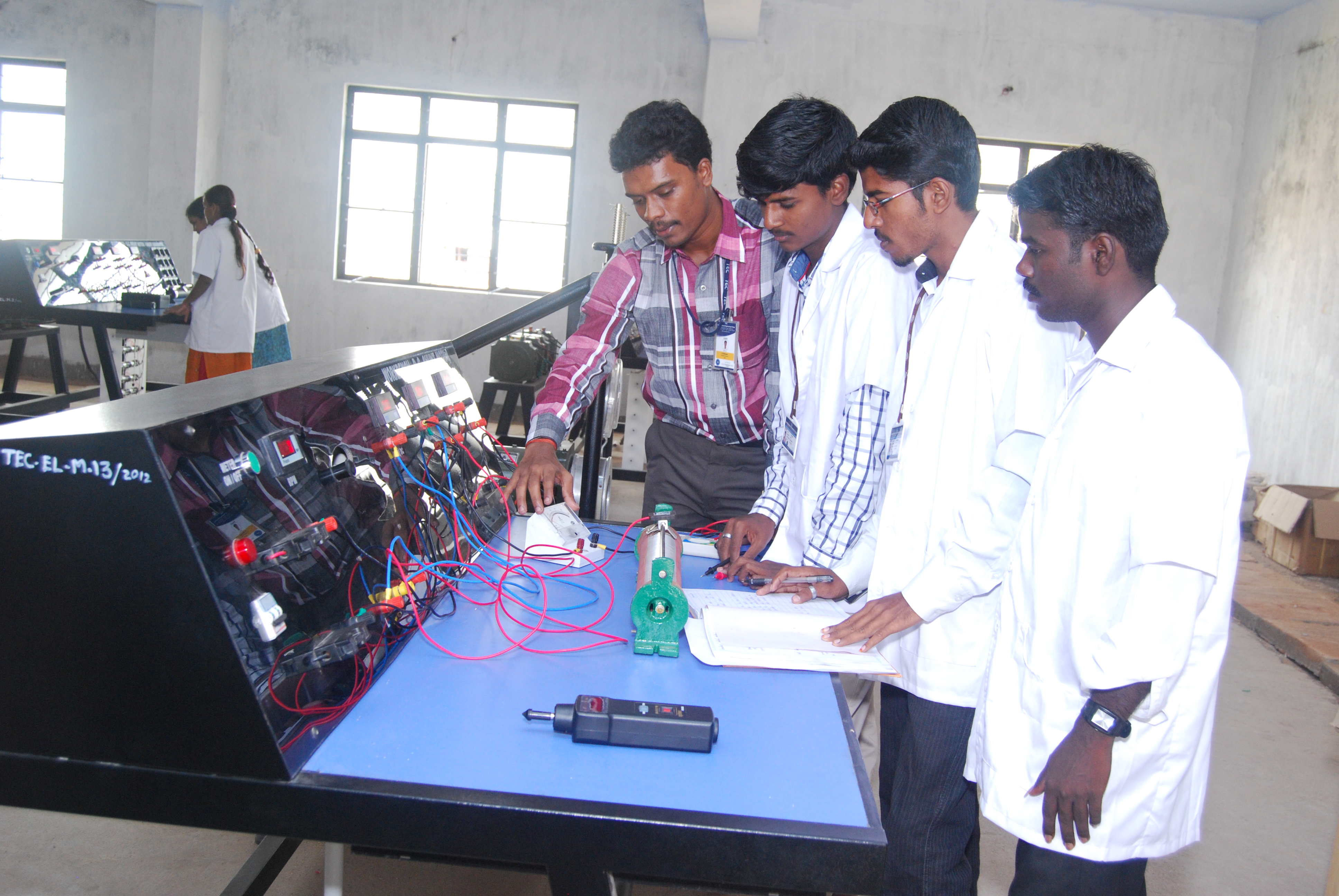Electrical and Electronics Engineering
 The program in Electrical & Electronics Engineering is one of the premier undergraduate programs offered by the Thamirabharani Engineering College. The EEE department has a team of highly qualified and experienced faculty. With its excellent infrastructure, the department places emphasis on sound practical knowledge, while nurturing creativity in the students. With Anna University’s curriculum, the Department places equal emphasis on theoretical and experimental electrical and electronics engineering.
The program in Electrical & Electronics Engineering is one of the premier undergraduate programs offered by the Thamirabharani Engineering College. The EEE department has a team of highly qualified and experienced faculty. With its excellent infrastructure, the department places emphasis on sound practical knowledge, while nurturing creativity in the students. With Anna University’s curriculum, the Department places equal emphasis on theoretical and experimental electrical and electronics engineering.
DEPARTMENT VISION
| To be a center of excellence in Technical Education and Research by adopting innovative teaching and learning methodologies in the field of Electrical and Electronics Engineering to meet the needs of the society. |
DEPARTMENT MISSION
| Providing adequate infrastructure and environment to the student community. |
| Adopting effective teaching learning methodologies and value added courses to impart strong fundamental knowledge. |
| Enhancing the opportunities to work on real world problems and develop sustainable ethical solutions. |
| Encouraging collaborative and multidisciplinary research activities to meet the societal needs. |
| Core Values: | Teamwork │ Research and Innovation │ Social Responsibility |
PROGRAM OUTCOMES (POs)
| PO 1 | Engineering Knowledge | Apply the knowledge of mathematics, science, engineering fundamentals, and engg. specialization to the solution of complex engineering problems. |
| PO 2 | Problem Analysis | Identify, formulate, research literature, and analyze engineering problems to arrive at substantiated conclusions using first principles of mathematics, natural, and engineering sciences. |
| PO 3 | Design/Development of Solutions | Design solutions for complex engineering problems and design system components, processes to meet the specifications with consideration for the public health and safety, and the cultural, societal, and environmental considerations. |
| PO 4 | Conduct Investigations of Complex Problems | Use research-based knowledge including design of experiments,
analysis and interpretation of data, and synthesis of the information to provide valid conclusions. |
| PO 5 | Modern tool usage | Create, select, and apply appropriate techniques, resources, and modern engineering and IT tools including prediction and modeling to complex engineering activities with an understanding of the limitations. |
| PO 6 | The Engineer and Society | Apply reasoning informed by the contextual knowledge to assess societal, health, safety, legal, and cultural issues and the consequent responsibilities relevant to the professional engineering practice. |
| PO 7 | Environment and sustainability | Understand the impact of the professional engineering solutions in societal and environmental contexts, and demonstrate the knowledge of, and need for sustainable development. |
| PO 8 | Ethics | Apply ethical principles and commit to professional ethics and responsibilities and norms of the engineering practice. |
| PO 9 | Individual and Team Work | Function effectively as an individual, and as a member or leader in teams, and in multidisciplinary settings. |
| PO 10 | Communication | Communicate effectively with the engineering community and with society at large. Be able to comprehend and write effective reports documentation. Make effective presentations, and give and receive clear instructions. |
| PO 11 | Project Management and Finance | Demonstrate knowledge and understanding of engineering and management principles and apply these to one’s own work, as a member and leader in a team. Manage projects in multidisciplinary environments. |
| PO 12 | Life-long Learning | Recognize the need for, and have the preparation and ability to engage in independent and life-long learning in the broadest context of technological change. |
PROGRAM EDUCATIONAL OBJECTIVES (PEO)
After few years of graduation our Electrical and Electronics Engineering graduates are expected to
| PEO 1 | Find employment in Core Electrical and Electronics Engineering and service sectors. |
| PEO 2 | Get elevated to technical lead position and lead the organization competitively. |
| PEO 3 | Enter into higher studies leading to post-graduate and research degrees. |
| Become consultant and provide solutions to the practical problems of core organization. |
PROGRAM SPECIFIC OUTCOMES (PSO)
| PSO 1 | Foundation of Electrical Engineering: Ability to understand the principles and working of electrical components, circuits, systems and control that are forming a part of power generation, transmission, distribution, utilization and energy saving. Students can assess the power management, auditing, crisis and energy saving aspects. |
| PSO 2 | Foundation of Mathematical Concepts: Ability to apply mathematical methodologies to solve problems related with electrical engineering using appropriate engineering tools and algorithms. |
| PSO 3 | Computing and Research Ability: Ability to use knowledge in various domains to identify research gaps and hence to provide solution which leads to new ideas and innovations. |
- Number of seats : 30
- Duration : 4 Years
- Fee : ₹ 45,000
